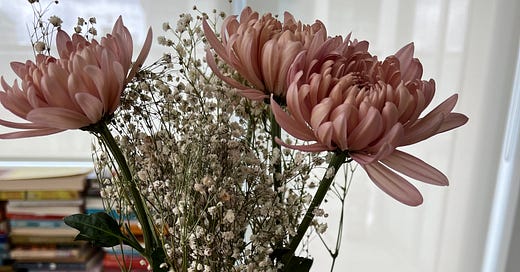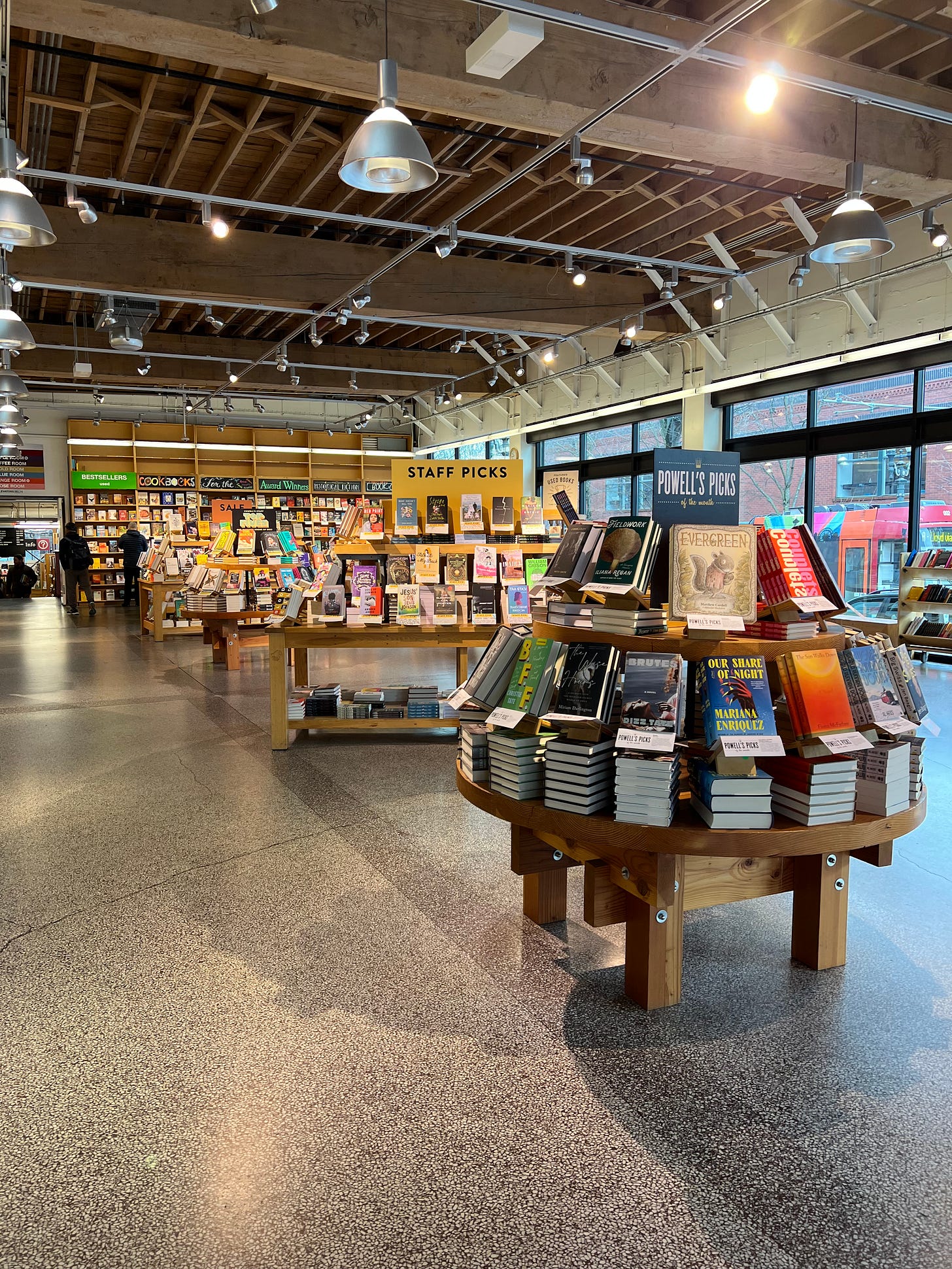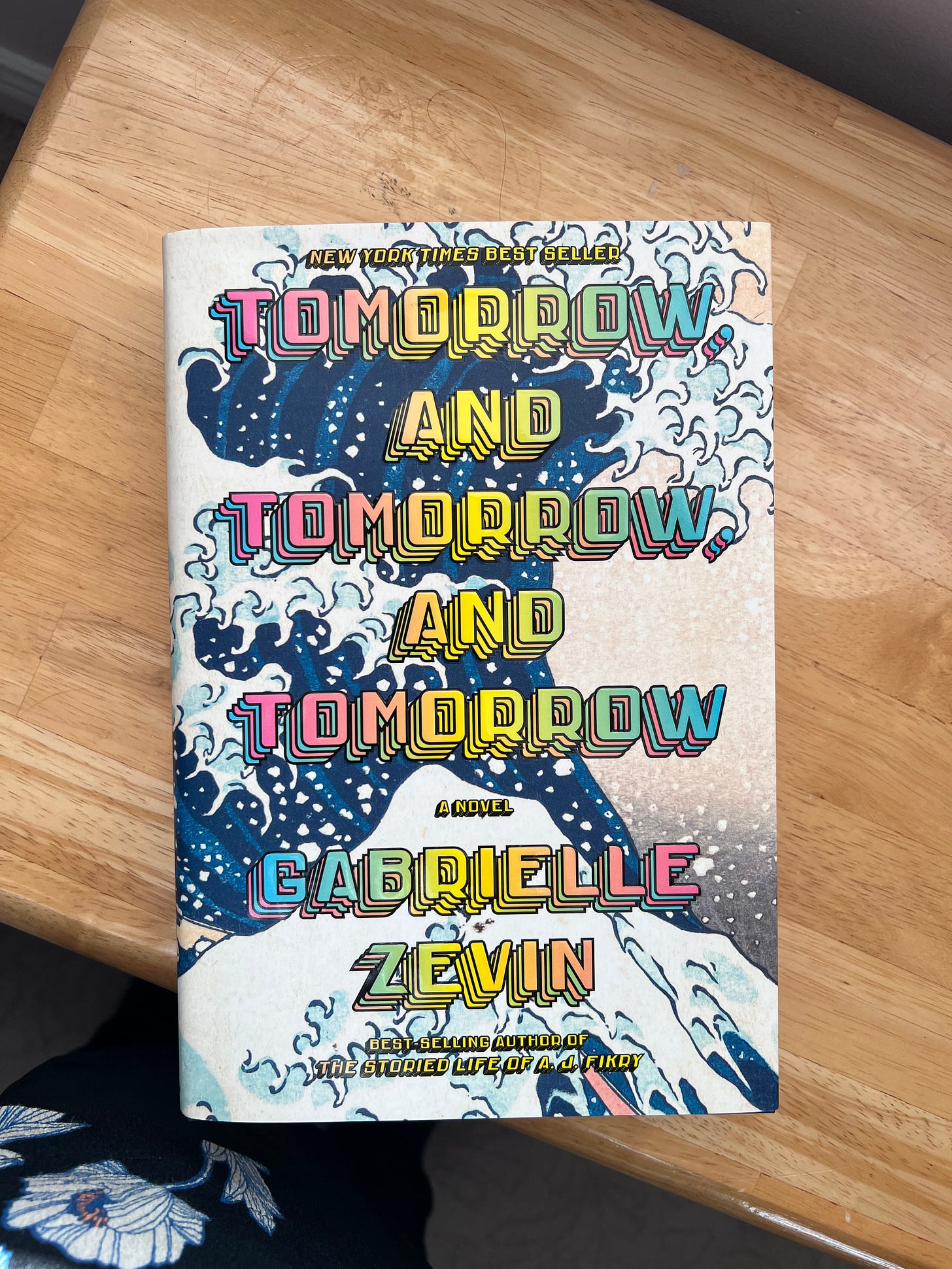It is infinitely dull to solely talk about men
On reading Tomorrow and Tomorrow and Tomorrow, learning new words and wondering if I'm failing the Bechdel test
I went to a stand-up comedy night a few days that was meant to honour International Women’s Day by featuring only female comics. I enjoyed going with a friend, I enjoyed the snacks, I enjoyed some of the comedy, but overall, I found myself thinking about the Bechdel test. The Bechdel test is a test you can do with any film, work of fiction. To pass it, the film, other work must have at least two women, these women must talk to each other and their conversation must be about something other than a man. The comedy night was not a film, but if it was, it would have failed the test.
Whether the comedians were single, dating, engaged, married, or married with children they described their relationship status (which included all of those configurations) almost immediately, and the majority of their set was about their relationship status and/or their partners. If single, it was about how men were terrible, and it’s hard to find a decent man, if dating, it was about the terrible, gross things boyfriends do, if married with children, it was about unequal divisions of labour, about incompetence.
I felt bored.
This was a night where we could have spoken about anything - a tremendous opportunity where there were no men in the lineup, and instead of talking about say, astronomy, public transit, wellness culture, travel, or anything else, instead, for the most part, the failures and idiosyncrasies of men, and the way patriarchy causes harm was what we spoke about. It felt like men were centered, and even without being on stage, they were on stage.
As the night wore on, I started to think about this newsletter. Was I doing the same thing? I admittedly, talk about my relationship a fair bit in these newsletters, mostly because when I got married, I couldn’t see books about Muslim women and love, and/or the journey of trying to apply principles of faith, mercy, equity and justice in the context of a relationship. I met and married my husband quickly, and so even in my previous blog, I wrote content for myself, that I wished existed already. I am the person who within the context of my relationship wants to discuss it, who will listen to podcasts, buy and read books, share articles, and watch films and television shows about relationships from a nonfiction and fictional perspective. My husband however, does not think about relationships to the same extent, and though he has a Substack, he writes about systems change, equity and facilitation.
What do you think? It is useful to hear about snippets of our home and relational life? Or am I failing the Bechdel test? I want to hear your thoughts, and in the meantime, now that I am more aware of how I share, I will try and talk about marriage less in the context of this space, and more about other aspects of my life and the world.
Take travel for example.
I never thought a bookstore would spark thoughts of life’s brevity, but a couple of weeks ago I went to Powell’s Books in Portland, and the visit made me think about my own mortality. I’ve wanted to visit Portland for years, and a major reason behind that desire was to visit Powell’s - a bookstore the size of an entire city block. I can spend hours in bookstores, and I thought visiting this bookstore would be an expanded version of that - an entire day of reading and debating over book purchases.
The opposite happened. Despite the beautiful book stacks, the handwritten staff recommendations and the curated bookshelves, I didn’t feel delight. It should have been paradise - there were books everywhere, rooms named by colour, a cafe, a second level that I never ventured to, and more books than I’ve ever seen in one place in my life. During my first visit, I left quickly because I felt physically ill. The second time, I stayed longer, had tea and cake at the bookstore cafe to fortify before exploring but it was still overwhelming, and I didn’t buy any books.
Instead of a playground, the bookstore felt like a physical reminder that life is finite. Whether you are a speedy or slow reader, whether you read 5 or 100 books a year, you can only ever read a minuscule, tiny fraction of the books that exist in the world. There is too little time to suffer through bad reads. There is just so little time in our lives overall. I don’t set reading goals anyway, but being in Powell’s has made me more conscious and keen to discard books that aren’t good, and be more intentional about what I do want to read.
Though I didn’t buy anything from Powell’s Books, I did read an incredible book on my trip called “Tomorrow and Tomorrow and Tomorrow” by Gabrielle Zevin. The book follows the journey of two protagonists, Sam and Sadie, who meet as children while Sam is recovering from a car accident and become friends based on their shared love of video games. The book follows their journey over thirty years, their shared and individual growth, their shared and individual failures, and their shared and individual joys and heartache. It is a remarkable and unusual book about games and art and disability and love and collaboration and identity and class and I loved it.
In particular, this book made me think a lot about how it can be difficult to disclose having a disability/being a disabled person, and how both silence and disclosure can shape the way others view you and your work. In the book Sam has a car accident as a child, and that injury continues to be a part of his life over the course of the book. He feels embarrassed about it, it causes him pain, it causes some of his coworkers to misunderstand his pain as lack of work ethic, it shapes the way he trusts or doesn’t trust others. It shapes his understanding of his own worth.
Alongside Sam is Sadie, a character who grows in confidence and voice over the course of the novel. We meet someone unsure and in awe in their youth, and we witness her grow in strength and surety:
She liked playing games, seeing a foreign movie, a good meal. She liked going to bed early and waking up early. She liked working. She liked that she was good at her work, and she felt proud of the fact that she was well paid for it. She felt pleasure in orderly things —a perfectly efficient section of code, a closet where every item was in its place. She liked solitude and the thoughts of her own interesting and creative mind. She liked to be comfortable. She liked hotel rooms, thick towels, cashmere sweaters, silk dresses, oxfords, brunch, fine stationary, overpriced conditioner, bouquets of gerbera, hats, postage stamps, art monographs, maranta plants, PBS documentaries, challah, soy candles, and yoga. She liked receiving a canvas tote bag when she gave to a charitable cause. She was an avid reader (of fiction and nonfiction) but she never read the newspaper, other than the arts sections, and she felt guilty about this.” (171)
Meeting Sadie made me think about what shapes who I am. We all have lists like this of things that we like, idiosyncrasies specific to just us, but I rarely think or list what those things are. But the act of reviewing is deeply informed by who you are.
In John Green’s book “The Anthropocene Reviewed: essays on a human-centered planet”, for example, he describes his wife Sarah’s observations after reading his reviews:
When I reviewed books, “I” was never in the review. I imagined myself as a disinterested observer writing from outside. My early reviews of Diet Dr. Pepper and Canada geese were similarly written in the nonfictional version of third-person omniscient narration. After Sarah read them, she pointed out that in the Anthropocene, there are no disinterested observers; there are only participants. She explained that when people write reviews, they are really writing a type of memoir —here’s what my experience was eating at this restaurant or getting my hair cut at this barbershop.” (p.18)
Partly why I have this newsletter, and follow other people’s book recommendations, is because although there is something magical about stumbling upon a new book and discovering something incredible, when you know someone/others, have a sense of what has shaped their perspective and trust it, it is useful to hear about their book experiences so that you can decide what might be worth your time and why that reviewer has made the assessments they have. This to me is far more valuable than simply seeing an aggregated star rating based on the opinions of people I don’t know.
So if I were to write out my likes, some of the things on that list would be: earl grey tea, independent bookstores, public libraries, reality television, plotless fiction, the colour pink, bubble tea, soft pyjamas, travelling, nice hotels, trains, walkable neighbourhoods, notebooks with crisp smooth pages, standup comedy, kayaking, long walks, ocean views, tote bags with book related sayings. My reviews/opinions about books are influenced by being Muslim, an immigrant, a woman, a lover of cities, racialized, a native English speaker, an experiencer of loss.
Below the paywall are my favourite quotes from the book, and my other favourite reads since the last newsletter.






